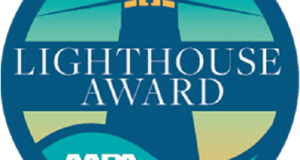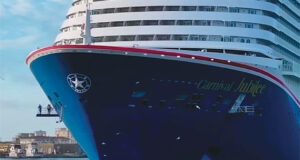
At the 2021 Latin American Congress of Ports, Rita de Cássia Munck was elected the new chair of the AAPA Latin American Delegation. Rita Munck is also chief of staff of the National Ports and Waterway Transportation Secretary’s Office (SNPTA) of the Ministry of Infrastructure of Brazil and has a long history in the maritime industry. She is an economist with a master’s degree in political science and a postgraduate degree in infrastructure policies and regulatory law. Since 2000, she has worked as a federal government public servant, as a career specialist in Public Policies and Government Management (EPPGG, i.e., Especialista em Políticas Públicas e Gestão Governamental). In the port sector, Munck’s career was focused on the area of management, and in addition to duties related to the cabinet, she served as chair of the Board of Directors, chair of the Audit Committee of Companhias Docas, and chair of the Port Authority Council of Porto de Imbituba, State of Santa Catarina.
She sat down with AAPA Seaports Magazine recently to share some insights, challenges, goals and Environmental, Social and Governance (ESG) initiatives at Brazil’s ports.
What are your goals in your current position as chief of staff at National Ports and Waterway Transportation Secretary’s Office (SNPTA) of the Ministry of Infrastructure of Brazil?
As chief of staff, I face several challenges that include actions not only in the area of management, but also in the areas of budgeting, finance and political articulation. The last two years have been quite challenging for all of us in the entire world. Even so, at SNPTA we managed to move forward in several directions.
New technology is one area we have focused on and developed. Through the Startup.gov Program, we implemented Porto Sem Papel Version 2.0, a paperless port system. Furthermore, the Janela Única Aquaviária project, which translates as “Single Waterway Window,” to be launched in 2022, will include Porto Sem Papel 2.0 as a module integrated into the Single Foreign Trade Portal of the Ministry of the Economy, in order to reduce bureaucracy to provide more predictability and safety to users, reduce process time and streamline waterway logistics for Brazilian foreign trade.
Another project under development is the Port Community System. Made possible by the support of the Prosperity Fund, a British investment fund for developing countries, it aims to develop initiatives to decrease the time spent importing and exporting products.
These efforts are bearing fruit. From January to October, according to data provided by ANTAQ1, Brazilian port handling increased by more than 5%. Ports such as Itaqui (Maranhão) and Itaguaí (Rio de Janeiro) experienced record growth (30% and 27%, respectively).
Also, 33 new port terminals have been auctioned on the Stock Exchange [B3] since the beginning of 2019, 13 of them in 2021. Among these was the largest auction of the last 20 years: the STS08A, liquid bulk terminal at Porto de Santos (São Paulo), with almost US$125 million of estimated investments. More than 20 lease auctions are expected to be held in 2022, with planned investments of close to US$1.1 billion. The scheduled auctions include the giant STS 11 bulk vegetable terminals with a 15 million ton capacity in Santos and planned investments of almost US$125 million, in addition to the Saboó STS 10 container terminal, also located in Santos, with more than US$ 360 million in planned investments. This terminal should generate 2 million TEUs of additional handling capacity to the port.
In addition to these, 116 authorizations for the operation of Private Terminals were approved. In total, almost US$4 billion in investments were authorized for terminals inside and outside the organized ports.
Another initiative to attract private investment is the privatization process in progress, with the first auction scheduled for March 2022, involving Companhia Docas do Espírito Santo (CODESA). The privatization of the Port of São Sebastião (São Paulo), the Port of Itajaí (Santa Catarina), Companhia Docas da Bahia (CODEBA), and the Santos Port Authority (SPA) are being structured, with an additional US$4 billion in private investments planned in total.
2021 will also go down in Brazilian history as the year in which a public policy was established for the growing cabotage sector in Brazil – the BR do Mar Program. This program brought a balanced flexibility to the policy for chartering vessels, which will generate great progress in the availability of fleets, at a more attractive cost, and for an ever-wider network of users of this logistical alternative.
The National Logistics Plan, with a time horizon until 2035, approved this year, is also extremely important as it represents the implementation of integrated transport planning in the country, crucial for its long-term development.
In this context, the use of ESG criteria has been advancing and the waterway sector is increasingly involved in the sustainability agenda, improvement of governance, and the social environment.
Within the strategies aimed at improving governance, in 2020 the Ministry of Infrastructure created the Anti-Corruption Radar Program, which brings together various actions to prevent and fight corruption in the infrastructure sector. These actions include the Selo Infra + Integridade project, i.e., Infrastructure + Integrity Seal, one of the most important, which aims to reward companies that do a good job of institutional integrity governance related to ethics, transparency, compliance, social responsibility, sustainability, and the prevention of fraud and corruption.
What strategies have been used by Brazil’s ports to address pandemic-related challenges?
With respect to facing the restrictions imposed by the pandemic, a series of measures were adopted to protect port workers and everyone entering the port areas, since one of our main objectives has always been to keep the maritime sector fully functioning, above all because it is essential for the country, since more than 90% of foreign trade passes through our ports.
The National Commission of Port Authorities (CONAPORTOS)2, adopted measures to address safety and health surveillance in organized ports and port facilities. The efforts of this Commission stand out, together with those of the Ministry of Health, in the early vaccination of port workers against COVID-19.
Also, at the AAPA Latino Meeting held in Cartagena, Porto de Santos was awarded the AAPA-CIP Port Industry Award of Excellence 2021 in the COVID-19 – Pandemic Response category, in recognition of the efficiency in its implementation of national and international safety protocols, including innovative measures to prevent contagion without hindering its competitiveness.
Also, we have a technical cooperation agreement with SEST/SENAT3 regarding the implementation of a health project in the public ports that includes health care in different areas such as dental, physical therapy, psychology and nutrition with expectations of 12,000 services by May 2022.
In spite of the restrictions imposed, a great deal of progress was achieved. In the quest for greater efficiency in our waterway sector, we worked quite a bit to eliminate bureaucracy, improve the infrastructure of public and private ports, attract private investment and, in short, to modernize the sector.
How is sustainability being figured into the growth of Brazilian ports and what projects/goals are currently in the works?
The Secretary has been working on a port management agenda in climate change scenarios, based on principles, objectives, guidelines and instruments provided by the Brazilian National Policy on Climate Change.
At present, several sustainability projects are being implemented in Brazilian ports, such as waste recycling initiatives; zero plastic; goals for reducing the consumption of energy, plastic cups, water and paper; contractual revisions requiring greater investment in more modern equipment with less environmental impact; a Green Hydrogen project; use of clean energy, awards for operating companies and lessees that stand out in meeting the sustainability requirement, among other initiatives.
The Suape Port Industrial Complex (Pernambuco), for example, received recognition last December for its excellent work in the areas of environment, port management and social responsibility, and its Integrated Management System (SGI) was awarded ISO 14001:2015 certifications, for environmental sustainability of native forests; NBR 16.000:2012, for social responsibility with the community attached to the nursery and socio-environmental responsibility throughout the whole Suape Complex; and ISO 9001:2015, for its quality in the management of port handling and of private companies in the complex.
Some of the Brazilian ports already belong to the select group that adheres to the Environmental Ship Index (ESI). This worldwide movement encourages the use of solutions that reduce carbon emissions in the atmosphere to levels below the standard established by the International Maritime Organization (IMO), with better performance in the reduction of atmospheric effluent emissions, such as nitrogen oxide (NOX) and sulfur oxide (SOX), as well as evaluating the energy efficiency of its operation. As an incentive, a discount is offered on port tariffs. The ports of Itaqui (Maranhão), Açu (Rio de Janeiro), Suape (Pernambuco) and Pecém (Ceará) are among the ports participating.
Several initiatives in the social area include projects aimed at tourism, environmental education, reverse logistics, recovery of degraded areas with the participation of the community, monitoring of fishing activities, in addition to the measures required for environmental licensing by the Brazilian Maritime Authority Regulations (NORMAM) and by the International Agricultural Surveillance System (VIGIAGRO) of the Ministry of Agriculture, Livestock and Supply.
We also work together with the Brazilian Navy in the Interministerial Commission for the Resources of the Sea, with a vast agenda ranging from discussions on the implementation of the UN Sustainable Development Goal Life below Water (SDG 14) to actions related to coastal management, with follow-up on the impact of climate change on coastal zones.
In 2021, ANTAQ created the ANTAQ Award, whose purpose is to recognize initiatives that stand out for their contribution to improving the provision of waterway transport services to society, promoting research and technical-scientific production, and disseminating good practices in the operation and management of the sector, giving awards in categories such as Environmental Performance and Innovative Initiatives.
In the Environmental Performance category, the Port Authorities of Organized Ports and the Private Use Terminals received awards, evaluated according to the Environmental Performance Index (IDA, i.e. “Índice de Desempenho Ambiental”). IDA, created in 2012, is the main tool for assessing the environmental management of port facilities regulated by ANTAQ.
What do you hope to achieve in your position as the AAPA Latino Delegation Chair?
The exchange of information and existing knowledge with other countries needs to be our guiding light. As chair of AAPA’s Latin American Delegation, I understand that I have an important mission to bring Latin American and North American ports closer together, to achieve a greater exchange of experience and better perspectives in the business environment, as well as increasing our actions related to ESG and inland navigation policy. I understand the importance of identifying the potential of the port sector of each country represented, giving visibility to as well as motivating the sharing of these exemplary actions.
On the occasion of the AAPA Latino 2021, which took place in Cartagena de Indias, Colombia, in November 2021, I took office as president of the AAPA’s Latin America Delegation and we started the arrangements for the AAPA 2022 meeting that will take place in Santos, Brazil. We will have an agenda focusing on environmental issues, the ESG agenda, new technologies and the search for investments in the sector.
 AAPA Seaports
AAPA Seaports


